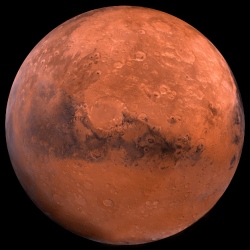
NASA has launched the “Journey to Mars Challenge” asking the public for their ideas for maintaining a crew on a Mars settlement. Three winners will be awarded $5,000 for their plans that are economically sustainable, achievable technically, and require very little support from Earth.
Moving in the Direction of a Manned Mars Mission
NASA is currently taking advantage of the public interest in landing people on Mars, but realistically they don’t anticipate having the capability to travel there until the 2030s. However, steps are being taken toward that goal and that begins with the Journey to Mars Challenge.
With all the information brought to light by the Mars rovers Curiosity and Spirit, people are more curious than ever. There are also five satellites orbiting Mars collecting data about the planet and offering insights. All the new information can provide a bounty of original ideas for the Journey to Mars Challenge.
Currently, one American and one Russian are on the International Space Station (ISS) for a one-year stint with the goal of learning the psychological and physiological effects of travelling for long periods in space.
In addition, the Orion Multi-Purpose Crew Vehicle spacecraft is being built with the capacity to take six astronauts out into space beyond Earth orbit for the first time since man went to the Moon. Along with Orion, a new Space Launch System (SLS) is to be a reusable super-sized, rocket system to take men and equipment into space and bring them home again.
NASA is Looking for Fresh Ideas
Acknowledging that they are not the end-all and be-all of think tanks, NASA is looking to the general public for new ideas on how to maintain a sustained presence on Mars once we get there. The Journey to Mars Challenge ideas can be concerning shelter, food, oxygen, water, medicine, exercise, travel and social relations are all being requested.
However, NASA isn’t looking for just suggestions thrown in a box. Ideas have to be realistic and achievable and must be accompanied by ways to implement, test and put the idea into practice. Suggestions must be backed up by facts and plans on how to make them a reality.
Resupply from Earth can take place only about every 500 days, so the people on Mars must be able to fend for themselves. In comparison, the ISS, which is considered fairly self-sufficient, must be resupplied every few months.
For those interested in submitting a proposal for the Journey to Mars Challenge, they better get on the ball and start researching all the new information that has become known about Mars over the past couple of years. New information about the red planet can help scientific thinkers come up with ideas on how to use what the planet has to offer.
